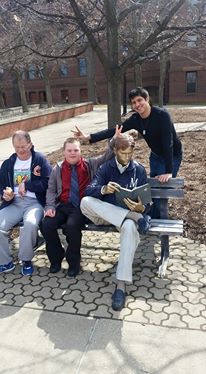Best Buddies out, Big Blue Buddies in

Best Buddies was founded in 1989, and has always relied on volunteers to work with people with disabilities. The Millikin chapter was recently cut from the national organization, prompting some people to wonder what happened.
The answer is far from dramatic – budget cuts. Best Buddies is a state funded program, and as the state of Illinois struggles to balance the budget. It’s often those that truly need help from the government that suffer the most. That certainly seems to be the case in this instance.
Thankfully, the active and devoted members of the Millikin chapter of Best Buddies refused to let their friendships with their buddies end. They have started a new Millikin group known as Big Blue Buddies, which essentially promotes the same things, but without the oversight, funding, or paperwork from the national organization.
Many of the members of Big Blue Buddies are people who have personal experience dealing with a family member or close friend who has a disability.
“A lot of the people involved with Big Blue Buddies are really dedicated because of their personal connections,” Serenity Barron, the president of the organization, said. “It’s something I feel really passionate about, and I’ve been so glad to see a lot of education majors joining up this year. I think that this experience will really help them in future classrooms.”
Education majors aren’t the only people getting involved. Now that Big Blue Buddies isn’t nationally related, the group is allowed to give out service hours for time spent at events and hanging out with a buddy. This has promoted some athletic groups to inquire as to how they can help, something that the organization is very excited about.
“One time the buddies lined up on the basketball court, and when the Millikin basketball team came out, they gave them all high-fives. It was a really nice thing to do and everyone enjoyed it,” Barron said.
Before being paired up one-on-one with a buddy, Big Blue Buddies conducts interviews to make sure that everyone gets a good fit. The interview is simple, and involves questions about a person’s experience with disabled adults, and how much time they are willing to commit.
There are two kinds of Big Blue Buddies membership. The first involves hanging out with your buddy twice a month – once at a planned on campus event and once on your own – as well as a phone call once a week. Associate membership in the organization only involves attending to the on-campus events. The members who choose the associate route won’t be assigned a buddy, but will be able to freely help and mingle with everyone at the events.
“My favorite memory is going with my sister and her buddy to Texas Roadhouse,” Emilee Gerk, vice president of Big Blue Buddies, said. “She had a great time sitting in the saddle, and then we went and saw Dolphin Tale. My sister’s buddy was so sassy and fun, it was a great time.”
Although the group is saddened at losing their national recognition, it has opened other doors for them. They think that communication will be easier, as they won’t be trying to coordinate with the national office. One problem they still face, however, is transportation. Big Blue Buddies relies on their members to provide their own rides to and from the group homes. This can make it difficult for someone without a car to create a close friendship with their buddy.
“Even just bringing them to campus can be hard,” Barron said, “A lot of them have mobility issues, we usually have our events in RTUC, and with the Mill’s parking lot closed, it can take close to 20 minutes to get the buddies from the parking lot to the building.”
Big Blue Buddies is new, but they hope that the student body will help them to grow and lend a hand to many of the people who need it most. They recognize that a lot of people don’t have much experience with people with disabilities, and often feel uncomfortable. However the best way to get rid of those feelings is through experience.
“Sometimes it can be hard to get time with your buddy. The group homes have liability issues, so it can be hard to get them to let you take your buddy out to something. Sometimes the people in these group homes only get to get out and go to a few events a month.” Barron said.
Big Blue Buddies has an active Facebook page, where they give updates about the buddies and share events that are coming up. If you’re interested in helping adults with disabilities, attending their first event on Sept. 26, at 2 p.m. on the Quad- where they are going to be tie-dying, playing Jenga and eating ice cream- or contacting Serenity Barron.
